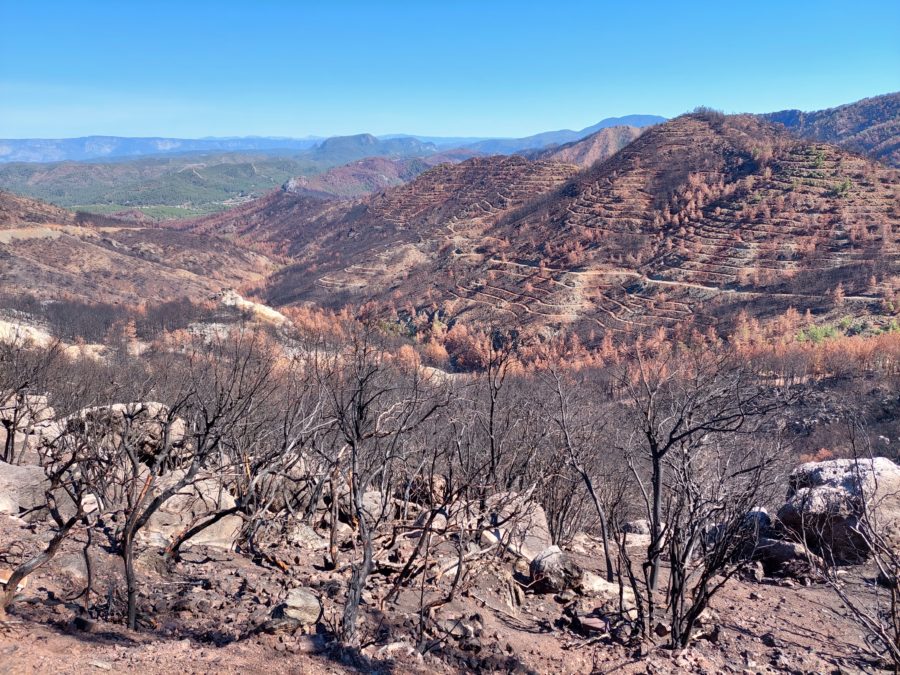
Nature Conservation Centre Foundation – DKM (Doğa Koruma Merkezi Vakfı) received a grant from our Turkey Wildfire Relief and Mitigation Fund, launched in collaboration with the Support Foundation for Civil Society (Sivil Toplum için Destek Vakfı). DKM’s project aimed to monitor the regeneration process of the red pine forests and maquis ecosystems, which were affected by the wildfires in the summer of 2021, with active citizen participation, and share the information with the public.
Read below our interview:
What is ecosystem restoration? What are the effects of ecosystem restoration on climate change?
Ecosystem restoration can be defined as the effort to return a damaged area, for any reason, to its original state in terms of species composition, structural features, ecosystem dynamics, and ecosystem services. Often, the public and even many experts perceive ecosystem restoration as merely reforestation, overlooking a comprehensive approach that considers all components of an ecosystem. Soil restoration, within this scope, involves practices aimed at improving the structure, functions, richness of microorganisms, nutrient density, and carbon levels of the soil ecosystem. Soil restoration practices directly contribute to enhancing the soil’s capacity to sequester carbon, making it an important tool for mitigating climate change.
With the earthquakes on February 6, the importance of environmentally compatible and sustainable living spaces has once again sparked discussions. Can you discuss the importance of environmentally compatible and sustainable living spaces?
Following the earthquakes, one of the topics brought to the forefront was the planning of cities’ reconstruction processes concerning the importance of environmentally compatible and sustainable living spaces. While discussing these issues, it’s crucial to consider not only disasters like earthquakes and floods but also the significant impact of climate change on Türkiye. Within this context, numerous steps can be taken in cities.
Modern cities can be designed to mitigate the adverse effects of climate change and enhance resilience. Globally, many good examples are addressing this issue; unfortunately, Türkiye’s performance in this regard is relatively weak. Approaches such as Nature-Based Solutions, Ecosystem-Based Adaptation, and Mapping Ecosystem Services prepare cities on a global scale for natural disasters and equip them with measures against the impacts of climate change.
Nature-based solutions, which help to reduce the harmful effects of climate change and disaster risks by working in harmony with nature, aid in preserving biodiversity, ensuring food and water security, and maintaining human health. They serve as a tool for transforming the effects caused by changing and predicted climatic conditions.
Ecosystem restoration efforts involve planning natural areas to retain water, ensuring flood control in settlements, increasing soil water retention capacity through rainwater harvesting methods (terracing, trenches, etc.), efficient use of water resources in agricultural practices, and opting for clean energy sources in efficient transportation. These practices serve as examples of creating environmentally compatible and sustainable living spaces in urban areas.
You have completed the project “Monitoring the Revitalisation of the Mediterranean Forests and Maquis Shrubland Ecosystem After the Wildfires” with our grant support. Can you tell us about the activities of this project?
The project had two main objectives: informing the public about the areas burned in Antalya, Mersin, and Muğla in 2021 and conducting monitoring activities using the citizen science method. Detailed spatial and biodiversity data related to the wildfires. The data not only identified the extent of the burned areas but also highlighted which significant species and habitats were affected. These findings were shared with the public through an interactive webpage. Another crucial aspect of the project was gathering information from various stakeholders and sharing them through meetings and discussions.
The project’s focus was not merely to produce information but to monitor these areas through a participatory approach. For this purpose, interfaces were integrated into the website, allowing citizens to track and share the changes in the burned areas. Although the project has been completed, the website and thus the mission of the project will continue.
How has the grant support you have received contributed to your organisation? Why do you think it is important for work in the areas of climate change, environment, and ecosystems to be supported by donors?
This project marked the first initiative focusing on participatory monitoring of wildfires, placing the public and decision-making mechanisms at the forefront. Contacts were established, and discussions were held with various official institutions and relevant civil society organisations. Through these discussions, consensus was reached on fostering cooperation between public institutions, CSOs and citizens in wildfire activities. The significance of supporting such projects, especially in today’s increasing climate disasters, cannot be overstated. The path to making Türkiye a country prepared for climate crises and safeguarding its nature lies in supporting climate change initiatives, ecosystem restoration, and participatory efforts.
Can you share the future plans and priorities of the Nature Conservation Centre?
As the Nature Conservation Centre, our focus will remain on the preservation of natural ecosystems and ecosystem restoration. Among our primary concerns is collaborating with practitioners to find solutions for preserving biodiversity and sustainable natural resource utilisation. For this purpose, we will continue to work with both public institutions and the private sector, along with engaging citizens. Ecosystem restoration remains a top priority for us, just as it is globally. Lastly, we will continue to work towards planning and creating sustainable cities, aiming to build more resilient communities against disasters.
About Nature Conservation Centre
Nature Conservation Centre was established in Ankara by a group of experienced ecologists and nature conservationists to provide a centrally organised pool of expertise and technical capacity for conserving biodiversity in Türkiye and the surrounding area with farmers, farmer’s associations, the government, and academic institutions in the light of the European Union policies.



